essay
Review, synthesize, and reflect on data you have collected about yourself. Weekly discussion in lab will help you to construct this SRL profile. The SRL profile creates an opportunity to draw on data from your weekly self assessments and weekly My Planners to review and summarize your strengths and weaknesses in terms of engagement, SRL, motivation, anxiety, emotion regulation, procrastination, time management, task understanding, goal setting, etc. Summarize and present a profile of YOU. The assignment will conclude with an SRL change plan in which you will choose to tackle/change one problem over the remaining part of the semester in terms of: (a) behavior/s, (b) thinking, (c) motivation, or (d) emotions/affect.
Prepare your answer in word or some other format. Cut and paste it into the text window for this assignment.
You must answer the following questions. This assignment should not exceed 1500:
(1) STRENGTHS: Looking across the topics and self-assessments covered to date, what are my main strengths? How can I leverage those strengths in taking control of my university success?
(2) WEAKNESSES: Looking across the topics and self-assessments covered to date, what are my main weaknesses? Why might addressing those weaknesses be important for taking control of my university success?
(3) CHALLENGES: After reviewing my 6 MyPlanners to date, these are the critical patterns I see in my weekly attempts to take control of my learning. For this you should pay particular attention to: (a) engagement (Q. 1), (b) Goal attainment (first question after STOP sign), (c) Challenges - particularly patterns over time in the challenges that get in your way, (d) Other things such as feeling or motivation reported in the myPlanner.
(4) TARGET FOR CHANGE: Based on what you have summarized above, identify and justify one main thing you want to tackle in the remaining part of the semester. This should be something you want to take control of. It should be something you see as critical for your success in one (or more) of your other courses. Be explicit about whether the thing you want to change is about changing a: (a) behavior, (b) cognitive process or outcome, (c) motivation, or (d) feeling (emotion/affect).
(5) HOW WILL YOU EVALUATE YOUR SUCCESS? What data do you need to collect to figure out if you have been successful in tackling/addressing that target for change. In addition list 5 self-assessments you would like to redo at the end to self-evaluate your change.
Weekly Self-regulated learning assessment
Week 1
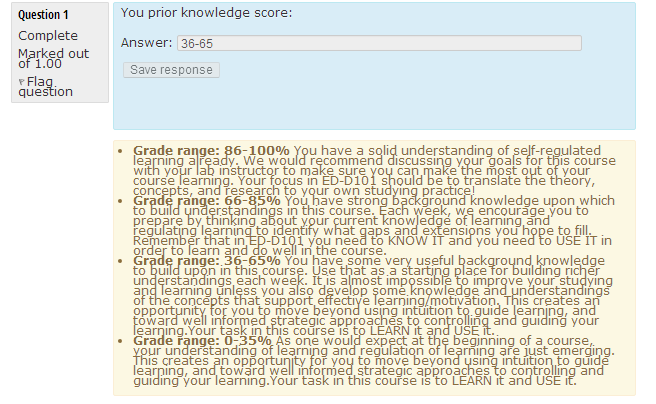
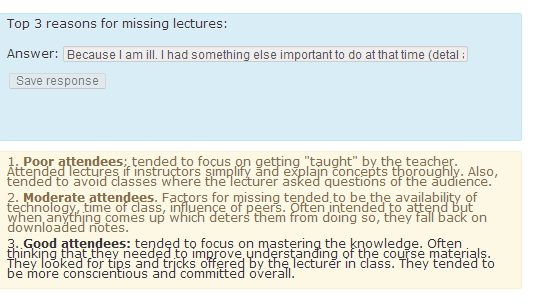
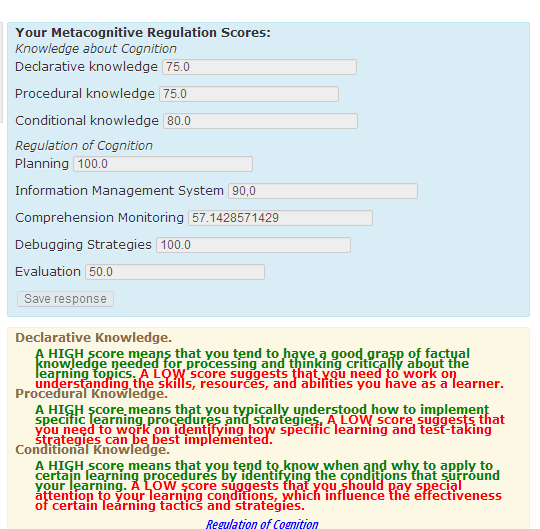
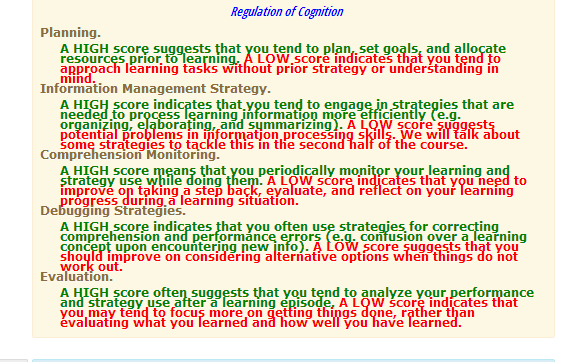
My strengths are knowing to creating goals and finding the correct adjustment to correct the problem.Through the report, the scores of planning, information management strategy and debugging strategies are relatively high. Personally, I am used to setting goals and planing before I started to learning, and I am satisfied with the good performance in organizing and engage in learning information more efficiently during the process. I also focused on using strategies to correcting my mistakes during the studying. I noticed that my weaknesses are comprehension monitoring and evaluation. I believe that I have trouble with reglecting on my learning progress during a learning situation, and I always ignored the evaluation. I paid more attention to the quality of the performance rather than focus on getting things done during a learning episode. My targets of regulation are encouraging me to get things done first, and then identify what needs to improve, make the appriate changes, and then follow through until the goal is accomplished.
Week 2:
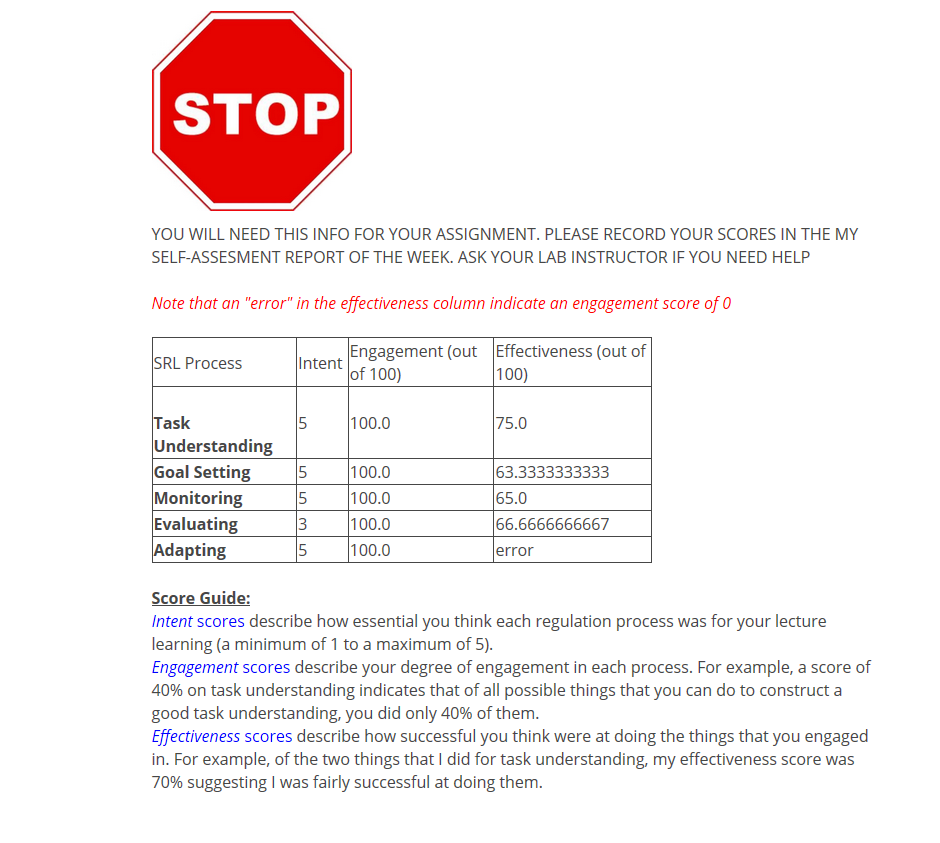
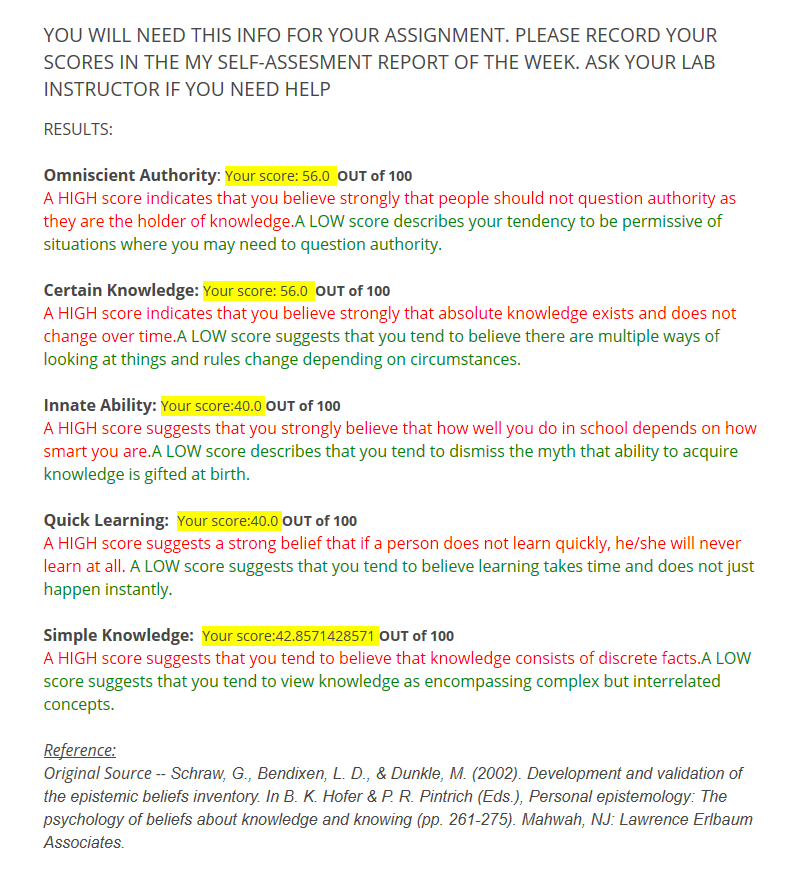
Week 3:
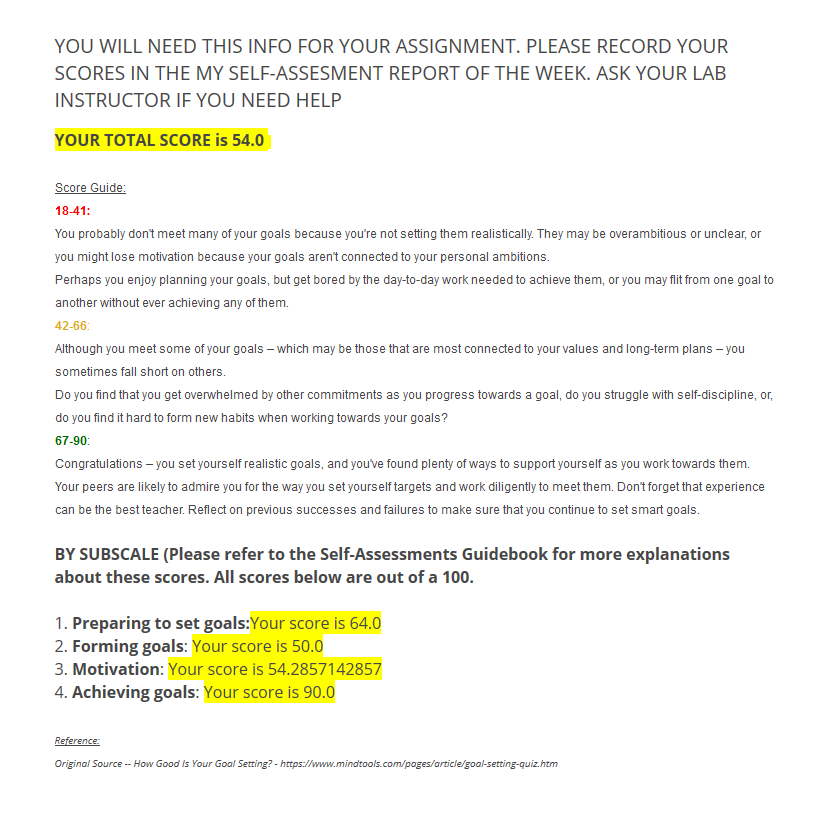
Below is the explanation by subscale:
1. Preparing to Set Goals
A low score on this requires you to adapt your approaches.
Many people miss out this stage when they set goals, and they struggle later as a result. The planning step is essential because you need to tie your personal goals to your personal values and dreams (and not to the goals and dreams of other people). This will help to motivate you when times get tough.
In EDD101, we talk about setting CAST goals and goals that emphasize the process of doing rather than the product. Refer to lecture slides and readings to lean more about CAST goals and why they matter.
2. Forming Goals
A low score on this requires you to adapt your approaches.
You are probably familiar with the idea of goal setting, but how do you make sure your goals have specific concepts to be learned, actions, standard(s) and timeline for them to be motivating? If you need guidance on setting specific and achievable goals, refer to lecture slides and readings to learn more about CAST goals. Ask your lab instructor for help. Then, familiarize yourself with typical goal-setting mistakes to make sure that you are not unintentionally holding yourself back.
Spend some time imagining the positive impact that achieving your goals will have on your life. Also, think about the times when you haven't been successful, or when you fail an assignment. Reflect on what went wrong, and whether there was anything you could have done differently – then take what you've learned and apply it to your new goals.
3. Motivation
A low score on this requires you to adapt your approaches.
There are plenty of ways that you can support yourself if you start to lose motivation during a tough patch.
Look for some quick wins right from the start. Keep working towards your goals by building them into your To-Do List or action program, and "park" other good ideas until you can do something about them – this will help you keep on top of multiple goals without getting distracted by exciting new ideas.
If you lose motivation, explore what is making you feel demotivated. Do you struggle with self-discipline, a lack of time or a drifting sense of purpose? Redesign your goals around your time commitments if you need to, or create smaller sub-goals to give yourself some "easy wins" to boost your enthusiasm.
It's also OK to ask for support from friends or colleagues. For example, you may want them to remind you of your bigger-picture dreams when you're finding things tough.
And remember: change is difficult, even when you're working towards something you want.
4. Achieving Goals
A low score on this requires you to adapt your approaches.
As you get nearer to your goal, plan how you'll celebrate success. This will spur you on to cross the finishing line!
You need to make time to recognize and enjoy your achievement – for your own sake, as well as to thank those who have supported you along the way.
After you've acknowledged your success, take a time to reflect on the process of achieving your goal. The second half of the MyPlanner guides this process for you. Think about what you found tough, what went wrong, and what went better than you expected. Build that self-knowledge into your future goal-planning.
Week 4:
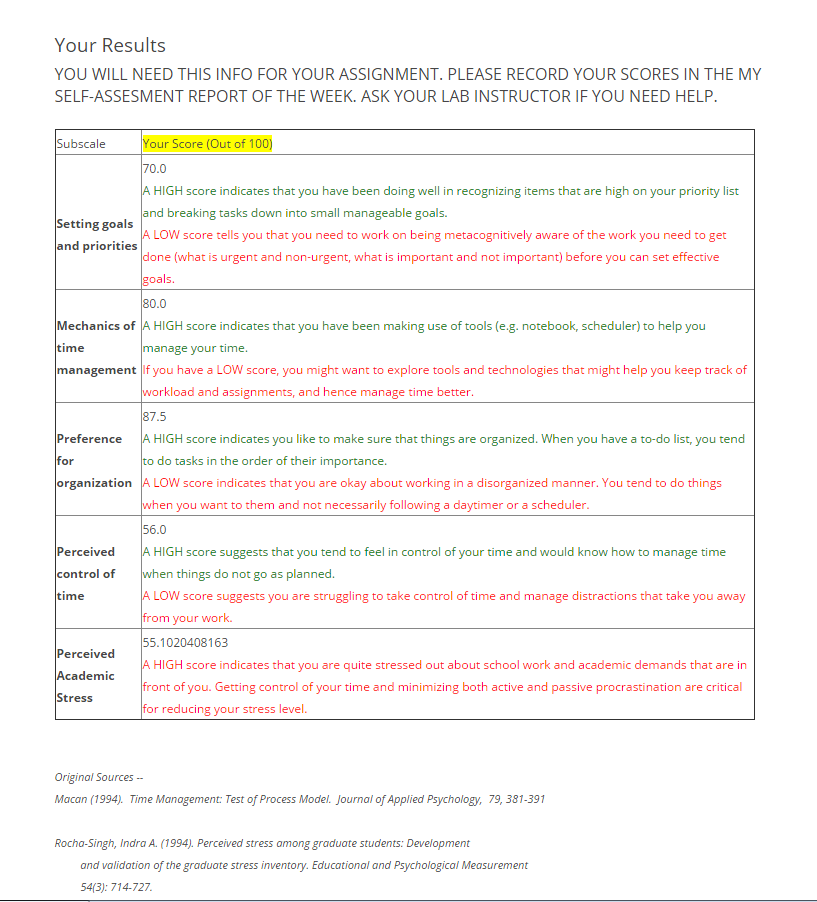
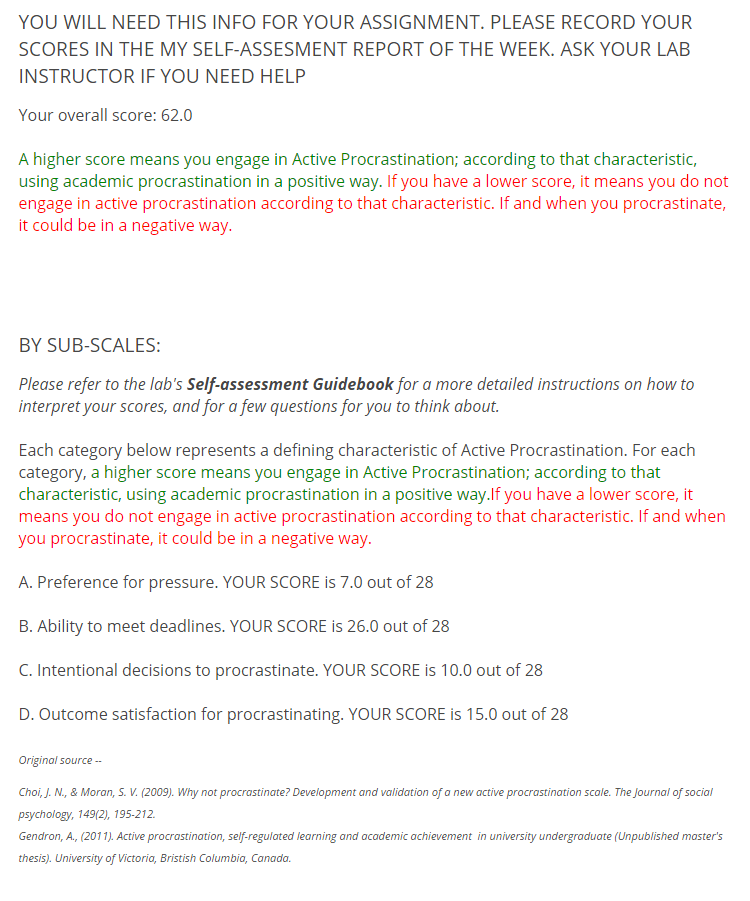
From time management behavior assessment and adaptive procrastination assessment, I can see that my strengths lie in that I can make a to-do list to stay organized before doing the tasks, and track the small tasks to finish it on time. I am used to using the notebook and app-MyStudyLife to manage my time effectively, and using the small moments between classes to do the achievable things. What is more, I knew how to use the CAST strategies to set the challenge but achieveable goals, break things down into small single work, and do one thing at a time. I am able to accurately estimate the minimum amount of time required to finish a task and push myself to efficiently toward a goal, even with last minute pressure. My weaknesses lie in that I can not manage internptions and distractors from others or the social media when I did the work. I always like to chat with my friends on Wechat or surf the Internet during the studying, and have no ability to take control of myself from time to time. Academic stress is an important problem that I need to overcome to some extent, I always felt stressed and anxiety before academic demands like deadlines and exams in front of me. I can not control my emotions in an effective way in order to cause the insomnia sometimes during the busy schedule weeks. I can not accept the high pressure so I try to avoid the procrastination to complete the tasks until the deadlines, although I always satisfied with task outcomes when I procrastinate. My targets of regulation are that I should learn how to deal with the stress and how to have the motivation and courage to try the things. I also should learn the strategies to take control of myself from the distractions during the study. Turn off the notifications for social media and avoid studying around people who aren't studying are my favourite ways. I should try to make changes and adaptations to become better during the term!
Week 5:
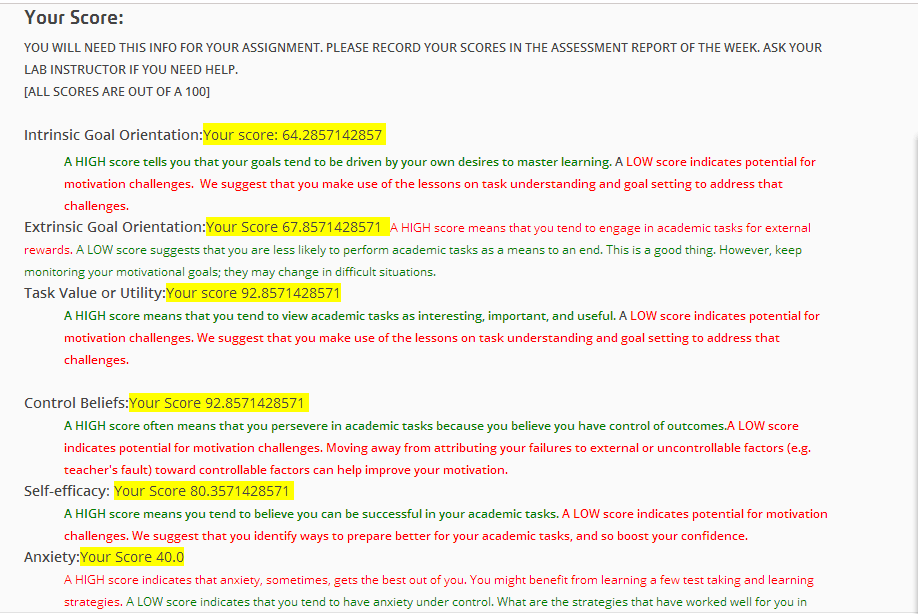
Weekly My Planners1-5
My problems in the My Planner 1-5 are procrastination, do not know how to reduce stress during the exams, can not control the emotions, and do not know how to make changes
Strengths:know how to set the specific goals and achieve them.



